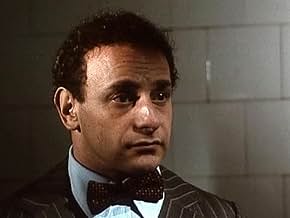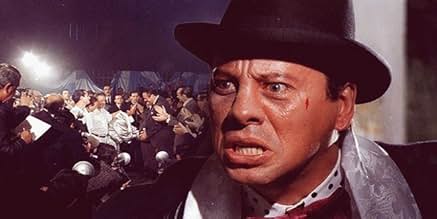José María Gatica fue uno de los boxeadores argentinos más populares de los años cuarenta. Pese a su talento, no supo aprovecharlo y fue autodestuyéndose, despilfarrando el dinero y dejando ... Leer todoJosé María Gatica fue uno de los boxeadores argentinos más populares de los años cuarenta. Pese a su talento, no supo aprovecharlo y fue autodestuyéndose, despilfarrando el dinero y dejando de lado los entrenamientos por la vida nocturna.José María Gatica fue uno de los boxeadores argentinos más populares de los años cuarenta. Pese a su talento, no supo aprovecharlo y fue autodestuyéndose, despilfarrando el dinero y dejando de lado los entrenamientos por la vida nocturna.
- Dirección
- Guionistas
- Elenco
- Premios
- 7 premios ganados y 6 nominaciones en total
Eduardo Cutuli
- Fioravanti
- (as Cutuli)
- Dirección
- Guionistas
- Todo el elenco y el equipo
- Producción, taquilla y más en IMDbPro
Opiniones destacadas
This is probably one of the worst films of all time. Bad in all departments, it is an insult to the audience that certain people praise this mistake.
There is nothing good to rescue from this piece of trash. In comparison, any film directed by Enrique Carreras is much better.
Even though, the only good thing featured in this disaster is the Mariano Mores theme "Tanguera", which was better recorded in 1955 by the Francini-Pontier orchestra for RCA Victor.
There is nothing good to rescue from this piece of trash. In comparison, any film directed by Enrique Carreras is much better.
Even though, the only good thing featured in this disaster is the Mariano Mores theme "Tanguera", which was better recorded in 1955 by the Francini-Pontier orchestra for RCA Victor.
Based on some of the enthusiastic reviews that I read here (including one claiming that this film "makes Raging Bull look like a kindergarden film"), I was expecting a very raw, potent biopic about José María Gatica, also known as "El Mono" ("The Monkey"), a popular Argentine boxer who fought in the 40s and 50s, whose personal life was undone by excess and decadence. Instead, the film feels stagey and melodramatic. The music is too sentimental. Much of the acting, especially Eduardo Nieva's in the main role, feels forced. I think he tries a bit to imitate Al Pacino or Robert De Niro, but his constant screaming isn't visceral, just annoying. Gatica does come across as an out-of-control nouveau riche (who reminded me a lot of a certain Argentine football legend), but his portrayal of the character isn't compelling enough to keep one interested throughout two hours. I think Erasmo Olivera, who plays the younger Gatica, has significantly more presence on the screen. The photography is sometimes quite powerful, while other times it risks being overly nostalgic. Probably the movie's strongest point, it seems inspired by some of the films of Francis Ford Coppola or Bernardo Bertolucci. I was disappointed by most of the fighting scenes, with one exception, a surreal moment that combines unakin visual and sound elements: on the one hand, slow-motion shots of two boxers resting between rounds, panting heavily, sweating and bleeding profusely, and on the other, the voice of a priest delivering Mass in Latin. It happens unexpectedly and, although hard to explain exactly why, it works like magic. Somehow, the whole is greater than the sum of its parts. I wish there had been more surprises like that, more unpredictability and mystery. To be fair, this is an undeniably ambitious, probably fairly expensive period film with great production (costumes, cars, etc.) But perhaps the project became too large and complex for the director to pay attention to the details and give life to the characters. Gatica's story is unique and sad, worthy of a biopic. But the film lacks punch, if you'll pardon the pun. I actually found it painful to watch – unfortunately, for all the wrong reasons.
I saw this film in Argentina in 1995 on television. This film is perhaps one of the greatest boxing and biopic film ever made in my opinion.
Even if you're not a boxing fan, You'll enjoy the beautiful color this film was photographed in. This film tells the story of an Argentinian boxer who becomes famous and falls faster than the Jake Lamotta character in Raging Bull. Add to all of this the historical background Gatica takes place in. In one of the more amazing scenes I have ever seen the character of Gatica has just lost his son but is more grief stricken by the death of Eva Peron who he has just visted on her death bed. Gatica is a socially detached character who seems to function according to his own rules. He is a womanizer and a brute but the film unlike Raging Bull does not ask us to judge him but to feel what he feels. Gatica is swept up by history even though according to himself he was'nt even that good and did'nt even want to fight. You have to admire the director who makes a Film and not some boring "Playhouse" drama. The film answers some of the toughest questions posed by visual planning scenes out and some great editing and music soundtrack which takes you through the times of 1940's & 50's.
Even if you're not a boxing fan, You'll enjoy the beautiful color this film was photographed in. This film tells the story of an Argentinian boxer who becomes famous and falls faster than the Jake Lamotta character in Raging Bull. Add to all of this the historical background Gatica takes place in. In one of the more amazing scenes I have ever seen the character of Gatica has just lost his son but is more grief stricken by the death of Eva Peron who he has just visted on her death bed. Gatica is a socially detached character who seems to function according to his own rules. He is a womanizer and a brute but the film unlike Raging Bull does not ask us to judge him but to feel what he feels. Gatica is swept up by history even though according to himself he was'nt even that good and did'nt even want to fight. You have to admire the director who makes a Film and not some boring "Playhouse" drama. The film answers some of the toughest questions posed by visual planning scenes out and some great editing and music soundtrack which takes you through the times of 1940's & 50's.
Great tense movie. Sad story of José María Gatica "The Monkey" looks like you're in a theatre watching the tape.
Very raw and artistic movie. Directed by Leonardo Favio.
Total drama.
Very raw and artistic movie. Directed by Leonardo Favio.
Total drama.
To the average film-goer, the name Jose Maria Gatica known as "El Mono" (That's Spanish for Monkey) means little or nothing. But, to South American and Argentine fans, the name brings back memories of a colorful, romantic, and controversial time in Argentine history.
Jose Maria Gatica was born in extreme poverty in the capital of Buenos Aires, Argentina. He learned to fight in the streets and was discovered by Nicolas Preziosa who turned Gatica into "El Mono" and made him the nations greatest boxing idol of the mid 1940s & early 1950s. Noted for his "hurricane" style of punching, Gatica racked up an impressive knockout streak and became the toast of the country. Argentina's dictator General Juan Peron and his beautiful wife Evita were ringside for most of his fights. He had a pet lion, drank the finest wines from a host of beauties high-heeled shoes. He dressed in silk suits & dined and danced in the best clubs.
However, knockout losses, and his "fast-living" spelled his complete downfall. And fall he did. Deserted by his fans, shunned by Peron, he quickly faded from the scene after having scored a remarkable 72 knockout victories. He ended up a sad sight; broke, selling nic-nacs in the street. He died at age 38 after being run-over by a bus.
This is a disturbingly, well-acted film. It captures a time now long gone. In some ways, it's the story of all us........chasing dreams....dreams of love.......dreams of glory.......dreams of riches....sadly, in many cases, those dreams have passed us by......as has the legend of Jose "El Mono" Gatica,once the idol of his nation.
Jose Maria Gatica was born in extreme poverty in the capital of Buenos Aires, Argentina. He learned to fight in the streets and was discovered by Nicolas Preziosa who turned Gatica into "El Mono" and made him the nations greatest boxing idol of the mid 1940s & early 1950s. Noted for his "hurricane" style of punching, Gatica racked up an impressive knockout streak and became the toast of the country. Argentina's dictator General Juan Peron and his beautiful wife Evita were ringside for most of his fights. He had a pet lion, drank the finest wines from a host of beauties high-heeled shoes. He dressed in silk suits & dined and danced in the best clubs.
However, knockout losses, and his "fast-living" spelled his complete downfall. And fall he did. Deserted by his fans, shunned by Peron, he quickly faded from the scene after having scored a remarkable 72 knockout victories. He ended up a sad sight; broke, selling nic-nacs in the street. He died at age 38 after being run-over by a bus.
This is a disturbingly, well-acted film. It captures a time now long gone. In some ways, it's the story of all us........chasing dreams....dreams of love.......dreams of glory.......dreams of riches....sadly, in many cases, those dreams have passed us by......as has the legend of Jose "El Mono" Gatica,once the idol of his nation.
¿Sabías que…?
- TriviaOfficial submission of Argentina for the 'Best Foreign Language Film' category of the 66th Academy Awards in 1994. However, it was pulled out of the competition by director Leonardo Favio himself as form of complaint about the problems of the film industry.
- Bandas sonorasTengo mil novias
Written by E. Cadicamo & E. Rodríguez
Selecciones populares
Inicia sesión para calificar y agrega a la lista de videos para obtener recomendaciones personalizadas
Detalles
- Fecha de lanzamiento
- País de origen
- Idioma
- También se conoce como
- Gatica, the Monkey
- Locaciones de filmación
- Productoras
- Ver más créditos de la compañía en IMDbPro
- Tiempo de ejecución2 horas 16 minutos
- Color
- Mezcla de sonido
Contribuir a esta página
Sugiere una edición o agrega el contenido que falta

Principales brechas de datos
By what name was Gatica, el mono (1993) officially released in Canada in English?
Responda





















